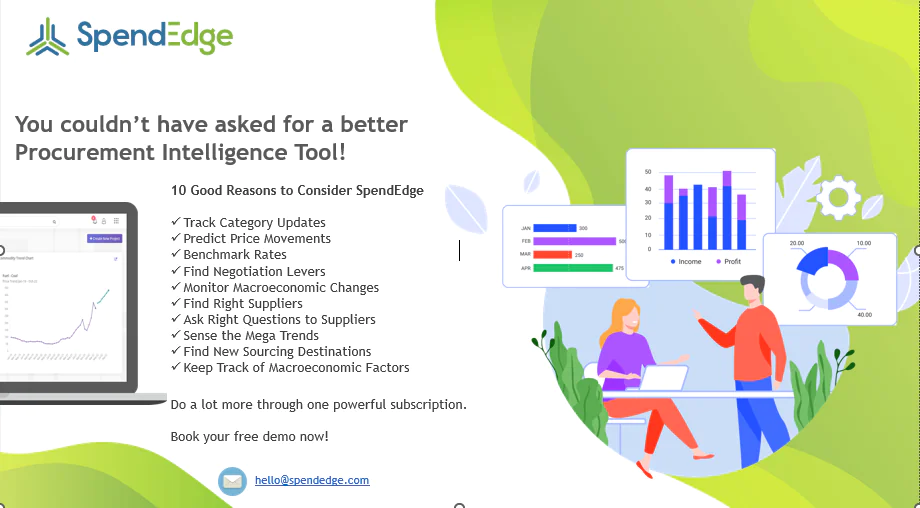Key Takeaways
- Strategic Alignment and Market Agility: The ability to shortlist and collaborate with the right suppliers enables businesses to respond swiftly to market changes and emerging trends. This agility is crucial for sustaining growth and seizing new opportunities in a dynamic business environment.
- Enhanced Quality and Customer Satisfaction: By selecting suppliers that align with the company’s quality standards and strategic objectives, businesses can consistently deliver products and services that meet or exceed customer expectations, thereby fostering loyalty and expanding their customer base.
- Cost Efficiency and Innovation: Effective supplier management not only helps in controlling costs through strategic negotiations and partnerships but also drives innovation. Access to cutting-edge technologies and materials through strategic suppliers allows companies to innovate, improving processes and products, which is essential for staying ahead of competitors.
- Risk Management: Proactive supplier selection and management contribute to robust risk management by ensuring compliance with regulations, reducing dependency on unreliable suppliers, and maintaining a stable supply chain even in adverse conditions.
In the complex landscape of global commerce, the act of shortlisting suppliers extends far beyond a mere procedural step in the procurement process. It is a strategic endeavor crucial for shaping an organization’s foundational capabilities, impacting everything from financial stability to operational efficiency and competitive positioning in the market. This comprehensive exploration delves into the profound impact of meticulous supplier selection, leveraging industry benchmarks to unveil the extensive advantages. Our aim is to provide an in-depth examination of the process, along with actionable insights and effective strategies for mastering supplier management in a manner that promotes sustainable business growth and innovation.
As businesses operate in increasingly dynamic markets, the ability to swiftly adapt supply chain strategies becomes essential for enhancing operational efficiency, minimizing risks, and capturing growth opportunities through innovative partnerships. Whether securing a dependable source of materials or integrating cutting-edge technological solutions, choosing the right suppliers is critical for sustaining market relevance and ensuring operational resilience. Therefore, understanding and implementing a robust process for shortlisting suppliers is indispensable for any business intent on maintaining a competitive edge and achieving long-term success.
The Importance of Supplier Selection
The significance of supplier selection cannot be overstated—it resides at the core of procurement strategy and plays a critical role in sculpting a supply chain that excels in efficiency and robustness against fluctuating market dynamics. This crucial process ensures that organizations form alliances with suppliers that not only promise but deliver exceptional value, aligning seamlessly with the organization’s long-term strategic objectives.
Key Benefits of Effective Supplier Selection
Improved Quality and Customer Satisfaction
Choosing the right suppliers is instrumental in maintaining high standards of quality in the production of goods or delivery of services. This is because suppliers are not just external entities; they are integral partners in your business operations. Their products and services directly affect the integrity of your final offerings to customers. High-quality inputs from reliable suppliers enhance product durability, functionality, and user satisfaction, leading to stronger customer loyalty and the potential for increased repeat business.
Cost Management and Efficiency
Strategic supplier selection extends beyond finding the lowest price point—it involves a thorough analysis to secure the best combination of price, quality, and service. By negotiating favorable terms and harnessing cost-effective solutions provided by suppliers, businesses can significantly reduce production costs and operational overheads. This efficiency not only impacts the bottom line positively but also enhances the value offered to customers, creating a competitive advantage in pricing without compromising on quality.
Risk Mitigation
In today’s global market, the risk associated with unreliable suppliers can be detrimental to business continuity and reputation. Thorough vetting of potential suppliers helps in identifying and avoiding risks related to financial stability, compliance issues, and supply disruptions. This proactive approach in supplier selection helps in building a resilient supply chain capable of withstanding various internal and external pressures, ensuring steady supply and minimizing the likelihood of operational hiccups.
Innovation
In a rapidly advancing technological landscape, partnering with innovative suppliers can provide businesses with access to new ideas, cutting-edge materials, and transformative technologies. These collaborations can lead to product enhancements, efficiency improvements, and even breakthroughs in new markets. Innovative suppliers are often the catalysts that enable businesses to stay ahead of industry trends and meet evolving consumer demands more effectively.
In essence, the strategic selection of suppliers is a cornerstone in the architecture of a successful business, influencing everything from product quality to market competitiveness. It requires a keen understanding of both the market and the internal needs of the organization, ensuring that every partnership fosters growth, stability, and innovation.
Supplier Selection Process
The supplier selection process is a meticulously structured approach, essential for ensuring that the chosen suppliers are in perfect alignment with a company’s strategic and operational needs. This multistage process not only secures the best possible value but also adheres to strict compliance standards, reinforcing both immediate procurement goals and broader strategic objectives. Below is a detailed exploration of each stage, integrating essential procurement and sourcing terminology to enhance understanding and application.
Stage 1: Identify Business Needs
The first stage in the strategic sourcing process involves a thorough analysis of the business’s core requirements, which may vary from essential raw materials for manufacturing to specialized services that support daily operations. This assessment must align with the company’s strategic plan, factoring in both current and future needs. Compliance with industry regulations and standards is paramount during this phase to ensure adherence to legal and quality benchmarks. Here, procurement professionals use enterprise resource planning (ERP) systems and strategic sourcing application suites to standardize sourcing requirements and streamline the procurement process.
Stage 2: List Potential Suppliers
Armed with a clear understanding of business needs, the next step is to compile a comprehensive list of potential suppliers. This task is often facilitated by e-sourcing software that helps identify suppliers through digital networks, industry publications, and dedicated sourcing platforms. Traditional procurement methods like attending trade shows and leveraging industry contacts are also employed to enrich the sourcing plan. This curated list is foundational, serving as a preliminary filter in the sourcing strategy and preparing the business for more granular evaluations.
Stage 3: Determine Supplier Selection Criteria
Developing precise supplier selection criteria is crucial for narrowing down the list of potential suppliers to those who can best meet the specific needs of the business. Criteria might include the quality and safety of products, adherence to delivery timelines, cost-effectiveness, and the level of service quality. Strategic sourcing examples often highlight the importance of aligning these criteria with the overarching purchasing strategy of the business. Procurement management tools and source-to-contract processes are typically employed to manage this critical step effectively, ensuring a seamless strategic sourcing experience.
Stage 4: Meet Suppliers and Conduct Audits
Engaging directly with suppliers and conducting comprehensive audits are vital activities in this stage. These meetings and audits allow procurement professionals to verify the suppliers’ claims about their products and services and assess their operational capabilities and compliance with sourcing agreements. Utilizing strategic sourcing software during these interactions can provide deeper insights into the suppliers’ operational standards and practices. This stage is crucial for fostering a procurement plan that supports robust, long-term relationships with suppliers.
Stage 5: Draft, Negotiate, and Sign the Contract
The culmination of the supplier selection process is the drafting, negotiating, and signing of the contract. This stage must articulate all terms and conditions clearly, covering aspects such as pricing, delivery schedules, quality standards, and payment terms. Negotiations are conducted with strategic objectives in mind, often involving senior roles such as the Chief Procurement Officer, who ensures that the contract supports the organization’s strategic sourcing process. E-sourcing tools and procure-to-pay platforms play an essential role in this phase, helping to finalize sourcing agreements that benefit both parties.
Through each of these stages, strategic sourcing practices integrate traditional procurement processes with modern technologies like e-sourcing and strategic sourcing application suites, creating a robust framework for businesses to manage their supplier relationships effectively and enhance their market position through strategic partnerships.
Challenges in Supplier Selection
Navigating the intricacies of supplier selection presents several significant challenges, which can impact the efficacy of the strategic sourcing process. These challenges often require meticulous attention from procurement professionals to ensure that the procurement processes align with the organization’s strategic plan and procurement management practices.
Incomplete Information
One of the most prevalent challenges in strategic sourcing is the issue of incomplete information. Suppliers might provide data that is either insufficient or overly optimistic, making it difficult for procurement teams to assess the true value and capability of potential partners. This necessitates a rigorous due diligence process, supported by e-sourcing software and strategic sourcing application suites, which help standardize sourcing requirements and ensure a more thorough review and comparison of supplier data.
Hidden Costs and Risks
The total cost of engagement with suppliers often extends beyond the initial price quotes. Hidden costs, such as fees for non-standard services, emergency shipments, or logistical expenses, can accumulate, significantly affecting the overall cost-effectiveness of a supplier. Additionally, there are risks associated with dependency on a single supplier for critical components, or potential disruptions in the supplier’s supply chain. These financial and operational risks demand a comprehensive strategic sourcing process that includes risk assessment protocols as part of the source-to-contract processes.
Communication Barriers
Effective communication is crucial in any business relationship and becomes particularly critical in supplier relationships. Miscommunication can lead to misalignment of expectations, errors in product specifications, and delivery delays, all of which can adversely affect the procurement cycle. Leveraging advanced e-sourcing platforms and employing clear, standardized communication protocols can help bridge these gaps. Strategic sourcing examples often highlight the use of collaborative tools that facilitate real-time communication and documentation sharing between procurement teams and suppliers.
Regulatory and Compliance Issues
Ensuring that suppliers adhere to relevant legal and regulatory requirements is another significant challenge, especially for industries that are heavily regulated. Compliance issues can range from environmental standards and labor laws to safety regulations and data protection rules. The procurement process must include comprehensive compliance checks, which are often integrated into enterprise resource planning (ERP) systems and procure-to-pay platforms. These systems assist in tracking supplier compliance and ensure that sourcing agreements reflect all necessary regulatory standards.
Strategic Implications
The strategic implications of these challenges are profound. They necessitate the involvement of high-level strategic positions, such as the Chief Procurement Officer, who must oversee the strategic sourcing process to align it with the organization’s overall strategic work and purchasing strategy. Outsourcing providers might be engaged to manage parts of the process, offering expertise and technological solutions to streamline and enhance the procurement process.
Overall, tackling these challenges requires a seamless strategic sourcing experience that incorporates advanced technology, strategic planning, and skilled oversight. This approach not only mitigates the risks associated with supplier selection but also maximizes the benefits, positioning the organization for long-term success and sustainability in its market.
SpendEdge’s Solutions to Enhance Supplier Selection
In the face of the complexities inherent in supplier selection, SpendEdge offers a suite of customized solutions designed to optimize the supplier selection process, addressing the nuanced demands of modern procurement environments. These solutions cater to the strategic and operational requisites of businesses, ensuring alignment with both immediate needs and long-term goals.
Supplier Management and Partnering Programs
SpendEdge’s Supplier Management and Partnering Programs are central to its strategy to enhance supplier relationships. This service involves a comprehensive process of identifying, evaluating, and recommending suppliers who are not only capable of meeting the current demands but are also strategically aligned with the client’s future growth and innovation paths. SpendEdge utilizes advanced sourcing platforms and strategic sourcing application suites to conduct deep dives into the suppliers’ capabilities, financial stability, and compatibility with the client’s corporate culture and ethical standards. This meticulous approach ensures that only the most suited suppliers are integrated into the client’s supply chain, fostering robust partnerships that are built to last.
Category Analysis
Through its Category Analysis service, SpendEdge provides detailed insights into specific procurement categories that are critical to the client’s operations. This analysis covers key areas such as cost, risk, and potential for innovation within each category, employing strategic sourcing software to dissect and understand market dynamics and supplier capabilities. The goal is to enhance the value obtained from each procurement activity by optimizing spend categories based on accurate, data-driven insights. This targeted analysis helps clients make informed decisions that directly contribute to enhancing operational efficiency and achieving cost savings.
Supplier Intelligence
SpendEdge’s Supplier Intelligence service leverages both e-sourcing tools and traditional procurement methods to gather and analyze extensive data on potential and current suppliers. This intelligence covers a wide range of critical factors, including but not limited to, supplier performance metrics, compliance with industry standards, and overall market reputation. The insights gained from this intelligence are pivotal in facilitating informed decision-making throughout the supplier selection process, enabling procurement professionals to anticipate potential issues and act proactively to mitigate risks.
Negotiation Advisory
Negotiation remains a critical phase in finalizing supplier relationships, and SpendEdge offers expert advisory services to assist clients during this phase. The company’s negotiation experts help clients secure competitive rates and draft service level agreements (SLAs) that are favorable yet fair, ensuring long-term value creation for both parties. SpendEdge’s strategic approach to negotiation emphasizes transparency and collaboration, aiming to establish agreements that support sustainable and mutually beneficial relationships. This is facilitated by strategic sourcing examples that provide benchmarks and insights into best practices across industries.
Through these specialized services, SpendEdge not only simplifies the supplier selection process but also adds strategic depth to it, ensuring that every procurement decision supports the broader business objectives. These solutions collectively contribute to a streamlined, effective procurement process that is capable of adapting to and thriving in the dynamic global market.
To learn more about how SpendEdge can transform your procurement strategies and help you achieve a competitive edge, visit SpendEdge.
Harnessing Strategic Supplier Selection for Business Success
The strategic selection of suppliers is an essential component of modern business operations, vital for maintaining and enhancing competitive advantages in the fast-paced global market. This article has thoroughly explored the multifaceted benefits and processes of effective supplier selection, highlighting how it can dramatically influence a company’s financial stability, operational efficiency, and market position.
Moving Forward
As the business landscape continues to evolve, the strategic importance of supplier selection will only intensify. Organizations must continuously refine their supplier selection processes to adapt to new challenges and opportunities. Investing in advanced procurement strategies and tools, such as those provided by SpendEdge, can significantly enhance the effectiveness of these processes. SpendEdge’s comprehensive suite of services—from supplier management and partnering programs to negotiation advisory—equip businesses with the necessary resources and expertise to optimize their supplier relationships and procurement activities.
For companies aiming to thrive, not just survive, in the competitive global marketplace, embracing sophisticated supplier selection and management strategies is not optional—it’s imperative. By effectively managing supplier relationships, businesses can ensure long-term sustainability and success, turning procurement into a powerful strategic lever in the corporate arsenal.
To discover how SpendEdge can empower your procurement strategies and help you harness the full potential of your supplier relationships, visit SpendEdge. Embrace the journey towards a more strategic and profitable procurement process, and watch as your business reaches new heights of success and market leadership.





